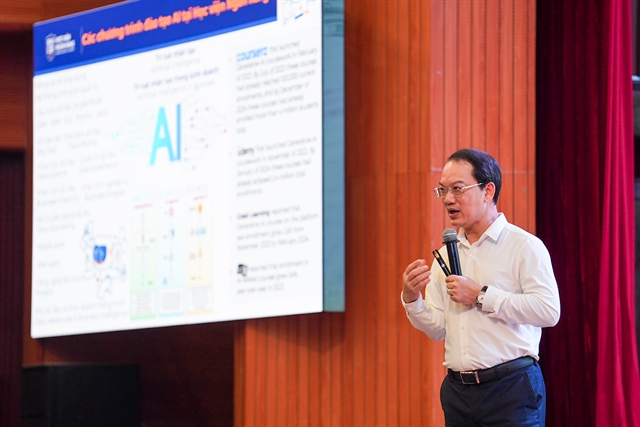 Economy
Economy

 |
| Dr. Phan Thanh Đức, Head of the Banking Academy of Vietnam’s Faculty of Information Technology and Digital Economics speaks at the event. — VNS Photo |
HÀ NỘI — As digital transformation reshapes every industry, comprehensive high-quality human resource development has become an urgent requirement for the Vietnamese banking sector, experts said at a seminar on Wednesday, highlighting the need for coordinated implementation among educational institutions and credit organisations to help the industry firmly step into the AI era.
Addressing the seminar titled ‘Human resource development in the AI era,’ held in Hà Nội by the Banking Times and the Banking Academy of Vietnam (BAV), Lê Thị Thúy Sen, Editor-in-Chief of the Banking Times, said the event contributed to realising the Politburo’s Resolution 57-NQ/TW on science, technology and innovation, and to implementing the goals of the National Financial Inclusion Strategy.
According to Sen, for the banking industry, digital transformation is not just a matter of technology but a process of changing thinking and working methods.
“Therefore, each bank and each staff member in the banking industry are striving to adapt and innovate to keep up with the digital age. Developing a workforce capable of mastering technology is the key factor for the banking industry to successfully implement digital transformation, innovation and sustainable development,” Sen said.
Head of BAV’s Faculty of Information Technology and Digital Economics Dr Phan Thanh Đức told the event that the demand for human resources in AI in Việt Nam is growing rapidly, but the supply has met neither quantity nor quality requirements.
“Currently, the market is short of between 150,000 and 200,000 technology workers each year, of which the group specialising in AI is the most serious shortage. In the period 2025–2030, demand for AI human resources is expected to increase by 74 per cent, focusing on areas such as data science, AI operations engineering, cybersecurity, and especially experts with practical implementation experience,” Đức said.
Director of Agribank’s Staff Training School Dr Nguyễn Thị Thu Hà said: “Despite the large number of employees, the banking industry is facing the problem of human resource quality in the digital age. In reality, a large proportion of current employees are not fully equipped with the necessary technology and data skills. Many banks face a lack of personnel who are good at data analysis and digital technology operations in addition to professional expertise.”
The demand for human resources in finance and banking, especially at the senior level, in the 2020–2025 period has increased by 20 per cent per year, accounting for about 5 per cent of total annual recruitment demand in major cities, Hà added.
To ensure a quality human resource supply in the digital age, experts suggested promoting the role of universities and training institutions, forming close links among banks, schools and students.
Associate Professor Dr Phạm Thị Hoàng Anh, Deputy Director of BAV, said: “Developing digital human resources is a task that cannot be done alone; it requires close coordination between the State Bank of Vietnam, training institutions and businesses. Therefore, the BAV hopes to continue receiving the support of credit institutions in placing training orders, sharing experiences, and creating internship opportunities for students, which will help form a team of young professionals with knowledge, skills and the courage to master technology in the digital age.”
Training institutions specialising in finance and banking need to innovate curricula, increase digital technology content, and update courses on data analysis, fintech, financial AI and cybersecurity. At the same time, the Ministry of Education and Training should develop output standards on digital skills for students in the banking and finance sector.
Banks should expand cooperation with schools through practical activities, such as sending experts to teach, sponsoring scholarships, providing learning equipment, organising internship programmes, and managing trainees. This allows students to experience the digital working environment and helps form a young workforce to meet the practical needs of the industry.
The event is part of BAV’s new student welcoming programme in 2025, which aims to spread the spirit of innovation, technology adaptation, and awareness of the human role in the digital age. — BIZHUB/VNS




